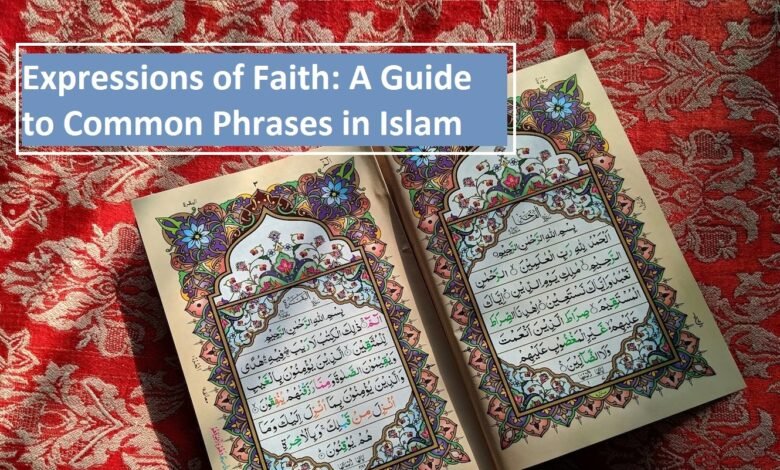
In the vibrant tapestry of Islamic culture and spirituality, language plays a profound role. The rich linguistic heritage of Islam is adorned with phrases that encapsulate the essence of faith, serve as daily affirmations, and foster a deep connection between Muslims worldwide. In this exploration, we will delve into some of the common phrases in Islam, shedding light on their meanings, cultural significance, and the everyday contexts in which they are used.
Introduction
Islam, being a global religion with a diverse community, has a linguistic landscape that reflects its universal appeal. The phrases used by Muslims daily serve as a bridge, connecting believers across borders and cultures. These expressions are not just words; they are manifestations of faith, carrying layers of meaning that resonate in the hearts of millions.
Foundations of Language in Islam

Before we embark on our journey through common Islamic phrases, it’s essential to understand the foundations of the Arabic language in Islam. Arabic holds a unique status as the language of the Quran, the holy book of Islam. Consequently, many common phrases in Islam find their roots in the Arabic language.
The linguistic legacy of Islam extends beyond religious texts, permeating daily life, prayers, and interactions. Let’s explore some phrases that echo through the corridors of mosques, homes, and hearts.
1. Bismillah al-Rahman al-Rahim
The utterance of this phrase marks the beginning of numerous activities in a Muslim’s day. From starting a meal to embarking on a journey, “Bismillah al-Rahman al-Rahim” invokes the name of Allah, seeking His blessings and mercy. It’s a reminder of the divine presence in every aspect of life.
2. Assalamu Alaikum: Peace Be Upon You
A universal greeting among Muslims, “Assalamu Alaikum” fosters a sense of peace and unity. Responded to with “Wa Alaikum Assalam,” this exchange encapsulates the essence of harmony and goodwill that Islam promotes.
3. Alhamdulillah: All Praise is Due to Allah
Expressing gratitude is a cornerstone of Islamic faith, and “Alhamdulillah” is the perfect embodiment of this principle. Whether acknowledging a blessing or overcoming a challenge, Muslims turn to this phrase to express their gratitude to the Creator.
4. Insha’Allah: If Allah Wills
This phrase reflects the Islamic understanding that all plans and actions are subject to the divine will. “Insha’Allah” is a humble acknowledgment that our efforts are contingent upon Allah’s approval, emphasizing the importance of humility and submission in the face of life’s uncertainties.
5. SubhanAllah: Glory Be to Allah
When marveling at the beauty of creation or witnessing an extraordinary event, Muslims often exclaim “SubhanAllah.” This phrase acknowledges the greatness of Allah and serves as a reminder of His infinite power.
6. Masha’Allah: Whatever Allah Wills
Similar to “Insha’Allah,” “Masha’Allah” is an expression of acknowledgment and appreciation. It is often used to commend someone’s achievements while attributing the success to the divine will.
7. Astaghfirullah: I Seek Forgiveness from Allah
In moments of reflection and repentance, Muslims turn to “Astaghfirullah” to seek forgiveness from Allah. This phrase underscores the importance of humility and the acknowledgment of human fallibility.
8. JazakAllah Khair: May Allah Reward You with Goodness
Expressing gratitude in a profound manner, “JazakAllah Khair” is used to thank someone with the hope that Allah will reward them with goodness. It reflects the Islamic ethos of recognizing and appreciating acts of kindness.
Conclusion
In this brief exploration of common phrases in Islam, we’ve merely scratched the surface of a vast linguistic ocean. The phrases mentioned here are not just linguistic tools; they are the threads that weave the fabric of Islamic identity. As Muslims across the globe continue to use these expressions in their daily lives, the language of Islam remains a powerful unifier, transcending cultural and geographical boundaries.
In the pursuit of understanding these phrases, one gains not only linguistic insights but also a deeper appreciation for the spiritual and cultural nuances embedded in the Islamic way of life. As we navigate our own linguistic landscapes, may these common phrases in Islam serve as beacons, guiding us towards a greater understanding of faith, community, and the divine.






